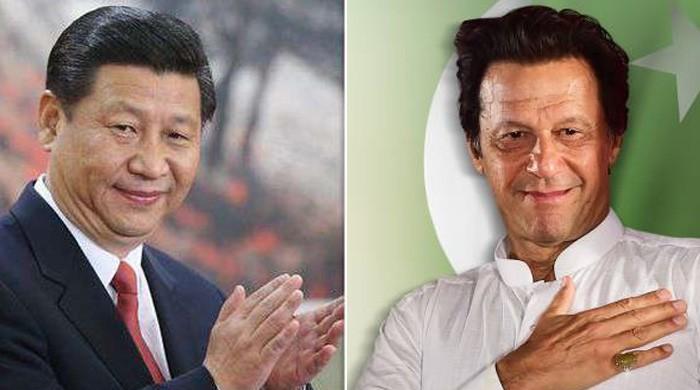
WHEN Prime Minister Imran Khan chose to travel to China over staying in Pakistan as mobs and violent protesters took to the streets across this country, PTI officials defending the foreign trip amidst domestic chaos argued that the economy was in dire straits and urgent assistance was needed. The implication was that Prime Minister Khan was required to go to China to secure quick money, loans, assistance and investments to shore up the Pakistani economy and state finances.
Imran Khan is back from his first official visit to China. Imran’s nervousness was apparent in his first interview to the Chinese media in which he repeated himself several times over, and he certainly did not come across as the head of a sovereign state. For a person of Imran Khan’s temperament, a visit primarily structured around a begging bowl couldn’t have been all that pleasant. For that is what it was in reality. Worse still, it was something which could hardly be hidden from the public gaze.
First, in the matter of the urgent need to get financial assistance, his meeting with Premier Li Keqiang was not propitious. Xinhua quoted him at a press conference as saying that China was willing to provide assistance to Pakistan “within our capability”, a statement unlikely to provide any relief to his guest. The same tone echoed in the followingmeeting with vice-foreign minister Kong Xuanyou where it was said that China had “made it clear in principle that (it) will provide necessary support and assistance to Pakistan in tiding over the current economic difficulties”.
It was also made clear that the actual amount of “assistance” will be discussed in subsequent meetings. Not a word about the rumoured $6 Billion Package, which was doing the rounds in the Pakistan media. The mood in Beijing was well encapsulated by Cheng Xiaohe, deputy director of the Centre for International Strategic Studies at Renmin University in The South China Morning Post He rather tartly noted while China was willing to assist Pakistan, it was finally Islamabad’s responsibility to take care of its own people. Coming to the crux of the matter, he observed that China had a liquidity problem due to its trade war with the US. Therefore Pakistan “must seek all kinds of assistance”. That’s as crisp as it gets.
Second is the issue of the nature and goals of Chinese loans and project assistance. Imran is no fool, and even before his election to the top post, the newly-elected prime minister had been stressing that Chinese assistance must also address the basic concerns of the people in terms of cheap housing, basic utilities and other aspects. In this he may get some reprieve.
The joint statement stated “Chinese assistance will also be directed towards agriculture, education, health, poverty alleviation, safe drinking water, and vocational training”. Even that quote has unwieldy strings attached. The “agriculture” aspect is entirely aimed at achieving Chinese goals. Remember the “CPEC Master Plan leaked mid last year, which indicated that Chinese enterprises would operate their otwn farms across thousands of acres in Pakistan, with an end to end plan ranging from seeds, logistics and market. That’s not assistance. That’s a take over.
Third, is the most ticklish aspect of a “re-negotiation” of Chinese loans that Imran and his team have been batting for. Nothing at all emerged on that front, and presumably, is going to be part of future discussions. The boiler plate joint statement did have some effusive language on Pakistan’s search for peace, and appreciated Pakistan’s “engagement” and “adherence” to the guidelines of the Nuclear Suppliers Group. No promise of membership as claimed by Indian media. Worse, the rest of the statement essentially commits Pakistan to the Chinese view on the Iran-US nuclear deal, and demanded ( as before ) a greater Chinese role in SAARC. None of this addresses Pakistan’s immediate concerns.
In conclusion therefore, Imran returned home empty handed. As the The Dawn observed, it is surprising that a prime minister should visit an important ally with expectations that were clearly belied by reality. Normally, a dozen preparatory meetings should have laid the ground for such a visit and its expected outcomes. Instead, it appeared that the prime minister was negotiating his own way out of debt, that too at a time when his country was virtually on fire due to the antics of an extreme right wing group bent on violence. Somewhere, somebody blundered.
For India or for anyone with an interest in South Asian stability, there are some aspects of interest. One aspect is that US-China trade confrontation has led to a state where China is reluctant to extend even minimal aid ( not assistance, which has conditions) to a valuable ally. Trade sanctions are therefore clearly biting. That’s interesting to say the least.
A second aspect is that Pakistan will have now have to rely on the IMF for its largest ever loan package. While this is certain to bite, it is less dangerous than a Pakistan virtually bought up by China. That’s not in anyone’s best interests, least of all Islamabad itself. A third aspect is that the “higher than a mountain, and deeper than the seas” friendship between the two countries seems to have come up against the earthy taste of reality.
Beijing is clearly not falling over itself to oblige Pakistan in terms of generous aid or social projects to any great degree. That last aspect will play itself out to the full only in the coming months. Wait and watch. This is only likely to get more interesting.



